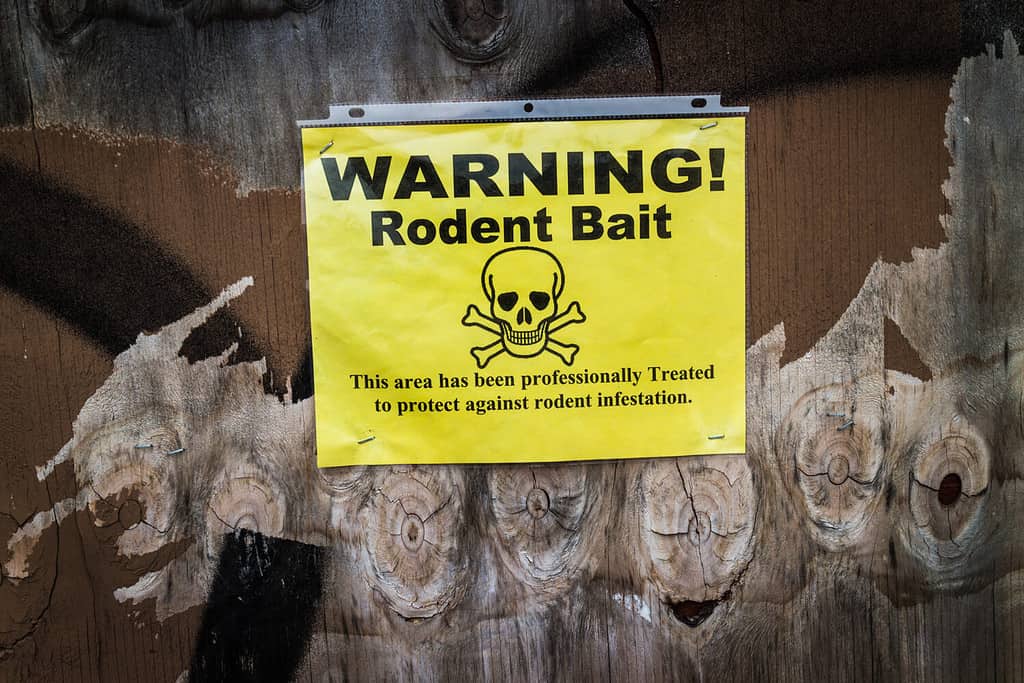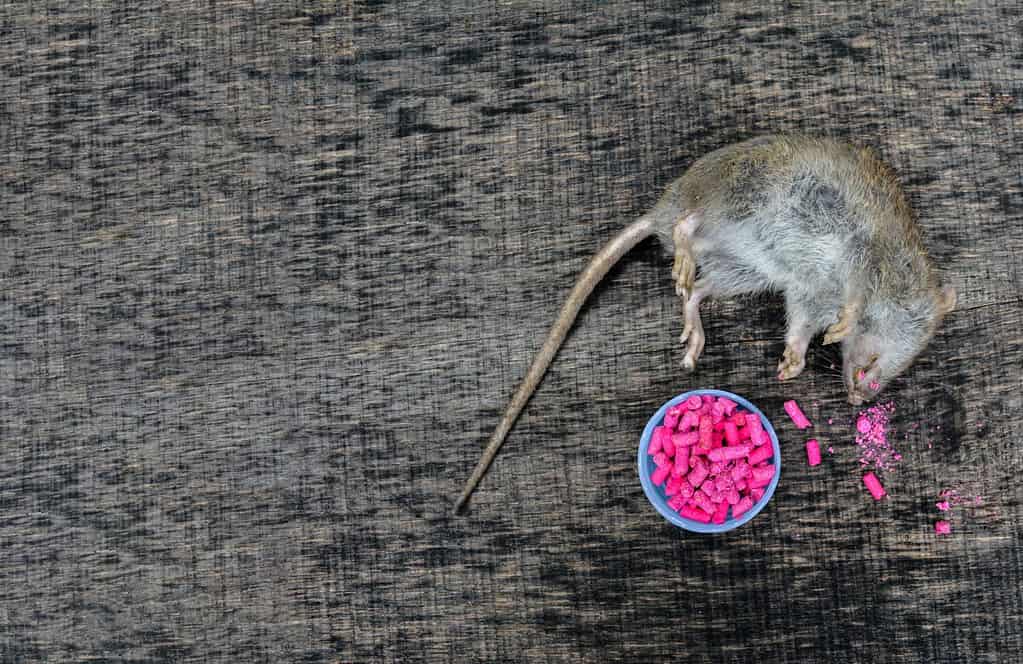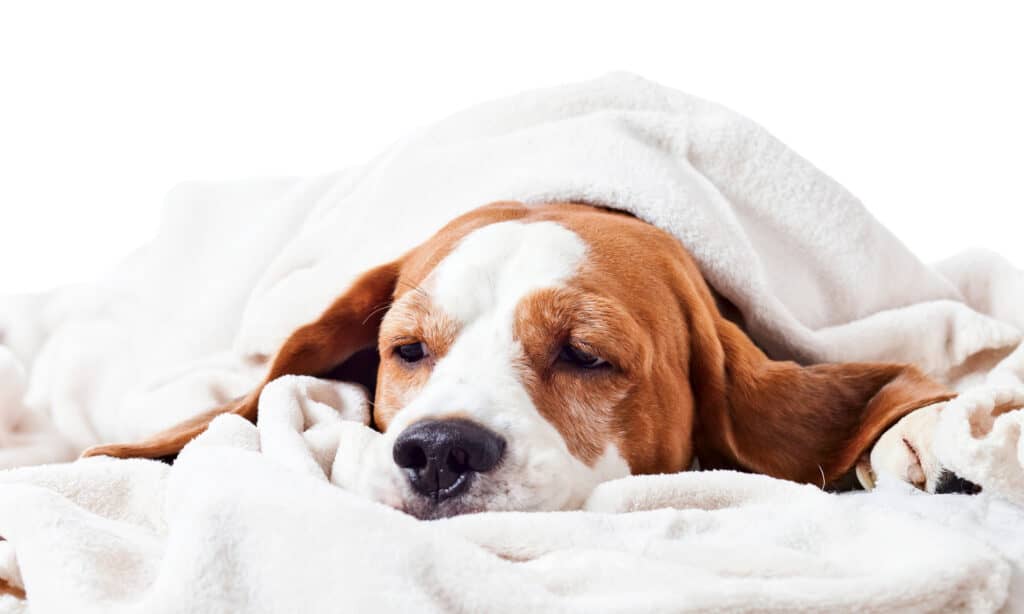Rats are undoubtedly an annoyance, but unless these rodents have consumed rat poison before your pooch gets a hold of one, they are not harmful to canines. Rodenticides, another name for rat poisoning, come in a range of types and forms.
To get rid of bothersome rats, you can buy commercial rat poison in the manner of blocks, pellets, gels, granules, powders, and fluids. But how dangerous is it if my dog ingests rat poison? The type of rat poison your dog eats determines how lethal it is. Keep on reading to find out everything there is to know to keep your pooch safe!

An anticoagulant ingredient is present in many rat poisons, which prevents blood from clotting.
©gabriel12/Shutterstock.com
Is Rat Poison Harmful to Dogs?
Yes, rat poison is toxic to canines. No rat poison should be used around dogs. Rat poisons are made primarily to kill rats, but because of the very toxic components and chemicals they contain, they can harm your dog’s well-being and even kill them.
One thing to remember is that rat poison is designed to taste good to draw in rats, therefore, it might also be a pleasant-tasting snack for your dog. Keep in mind that many poisonings contain a basis of sugar or grain for flavor.

One thing to remember is that rat poison is designed to taste good to draw in rats, therefore, it might also be a pleasant-tasting snack for your dog.
©weha/Shutterstock.com
Prevention is Key
If we can prevent pups from eating rat poison, all the better! All rodent poisons should be stored safely and out of the reach of your dog. Think about using non-poisonous live traps as an alternative method of pest control.
If you must apply rat poison, maintain a thorough note of the quantity used. Make sure you are aware of the type of product you are using, as well as the main ingredient.
If you need to use the ingredients for veterinary therapy, take a picture of them. When feasible, it’s ideal to choose a pet-friendly product. Mark the area where you threw rat poison when using it on the ground.
Asking whether they have rat poison around when visiting a friend or sitter with your pooch can help. Never allow dogs to consume strange objects when out walking as these can contain toxins and poisons that are difficult to identify after the fact.
Last but not least, keep in mind to keep a close eye on your pet’s stool because many rodenticides contain colors, which may be visible before serious symptoms start.
What Will Happen if My Dog Eats Rat Poison?

One of the challenges in managing man’s best friend for rat poison is that various treatments may be necessary for different substances.
©SeventyFour/Shutterstock.com
Depending on the exact poison they include, different rat poisons will have varying effects on your dog. An anticoagulant ingredient is present in many rat poisons, which prevents blood from clotting. Internal bleeding may potentially result from this.
Warfarin, bromadiolone, diphacinone, brodifacoum, and chlorophacinone are some of the active compounds that can be detected in rat poisoning. Cholecalciferol, generally known as vitamin D, is a poison that is extensively utilized. Extreme dosages can harm the kidneys or cause heart issues. This results in renal failure.
Because it raises the sodium content in cells, bromethalin may be the cause of brain inflammation. Cells inflate and decompose as a result of the salt attracting more and more water. Your dog might die from it.
Alpha chloralose, a common component, depresses the central nervous system and can cause havoc. Although only specialists often employ aluminum or zinc phosphides to treat infestations, they will cause your dog’s stomach to release phosphine gas.
One of the challenges in managing man’s best friend for rat poison is that various treatments may be necessary for different substances. You must know which type of rat poison your pup may have consumed so that your veterinarian can give the appropriate remedy.
Signs Your Dog Ate Rat Poison

Even in the absence of obvious symptoms, your dog should be treated if you believe that they have consumed poison.
©iStock.com/igorr1
Your dog may respond to poisoning differently based on the chemical employed in the poison, and the indications will fluctuate.
Your dog runs the risk of internal bleeding if they consume a toxin that is an anticoagulant or a rodenticide. This needs immediate attention since it might be fatal. It’s possible that symptoms won’t appear until many days after your dog has consumed the poison.
Even in the absence of obvious symptoms, your dog should be treated if you believe that they have consumed poison. Here are some common signs that your pooch may have ingested rat poison:
- Blood in stools
- Lethargy
- Weakness
- Nose bleeds
- Coughing up blood
- Respiratory difficulty
- Pale gums or gums that bleed
- Bleeding during defecation or urination
- Vomiting
- Bad breath
- Bruising
How Much Rat Poison Does It Take To Kill A Dog?
If your dog has consumed enough poison to cause its death will depend on the type and amount of the poison. Remember the design of some of these toxins will only become effective after repeated intake.
Some toxins start working right away after one dose. Contact your veterinarian or your neighborhood poison control center right away if you believe your dog has consumed even a small amount.
Can a Dog Survive Eating Rat Poison?
When a dog consumes anticoagulant rat poison, they face the risk of internal bleeding, which, if left untreated, can result in a fatal outcome. Symptoms may not become apparent until approximately three to five days after ingestion.
Therefore, it remains crucial to seek treatment for rat poisoning promptly, even if your dog is not exhibiting any visible signs of distress.
At the outset, dogs do not exhibit any indications of anticoagulant poisoning. Following the ingestion of this type of bait, it typically takes one to two days for the body to deplete its reserves of vitamin K1 and clotting factors.
As a result of this, it can take three to seven days before symptoms of poisoning emerge, resulting from the loss of blood-clotting capability.
How Veterinarians Diagnose Rat Poisoning in Dogs

Your dog’s cognitive and neurological condition will be evaluated by the vet first, and any bleeding, bruises, or abdominal pain will also be looked for.
©iStock.com/shironosov
They will gather a detailed medical history from the emergency veterinarian to aid in their evaluation. Bring the bait packing if you can, as knowing the active ingredient is essential for treatment.
Making a call to the pet poison helplines may also be helpful because they can check the product’s label information. To ensure that your dog receives medical attention as soon as possible, call the helpline if you can while traveling to your emergency vet clinic.
Your dog’s cognitive and neurological condition will be evaluated by the vet first, and any bleeding, bruises, or abdominal pain will also be looked for. During a baseline assessment, it will probably be advised to perform a complete blood count, serum blood chemistry with electrolytes, and urinalysis.
Coagulation panels (PT/PTT) may also be advised to examine your dog’s capacity to clot, depending on the active ingredient. Bloodwork results that seem normal at the point of the appointment frequently need to be watched over for the next one to seven days.
Based on your pet’s clinical symptoms, additional testing like chest or stomach X-rays are advisable.
Treatment for Rat Poison Ingestion
Rat poisoning in dogs requires medical attention as quickly as possible. It is crucial to identify the sort of rat poison because the treatment will differ depending on the active ingredient.
The veterinarian will probably induce vomiting for the majority of active chemicals. Because there is a risk to people if the active components contain zinc and aluminum phosphides, the veterinarian might induce vomiting in a well-ventilated location. Another poison treatment involves active charcoal.
The precise active substance consumed will determine the course of treatment after vomiting. Treatment for anticoagulant rodenticides includes hospitalization for intravenous fluids, plasma and/or blood transfusions, further supportive care, and at least a month of daily vitamin K. This also involves gastrointestinal support, oxygen therapy, and antiemetics to lessen nausea and vomiting.
If a dog consumes rat poison that contains either cholecalciferol or bromethalin, there is no cure. Both instances will likely require hospitalization and Intravenous therapy. Cholecalciferol-ingested dogs will also receive treatment to lower calcium levels. Bromethalin-ingested dogs will receive treatment to lessen brain swelling.
Antacids and other related drugs are necessary to lessen the formation and effects of the lethal phosphine gas used to treat rodenticide poisoning caused by zinc and aluminum phosphide. Moreover, drugs to manage seizures or tremors as well as liver protectors are in use.
Recovering From Rat Poison in Dogs

Overall, if a dog is treated right away after consuming a rodenticide, their prognosis is favorable.
©Patryk Kosmider/Shutterstock.com
Dog rat poisoning requires aggressive, immediate treatment after identification. No matter what the active component in rat poisons is, they can all be deadly. Canines have the best chance of surviving if they are seen by a veterinarian almost immediately.
Overall, if a dog receives treatment right away after consuming a rodenticide, their prognosis is favorable.
Depending on the active component and the amount of rat poison consumption, the majority of dogs need to stay in the hospital for monitoring and treatment for two to six days. Blood tests are taken frequently if needed.
Ready to discover the top 10 cutest dog breeds in the entire world?
How about the fastest dogs, the largest dogs and those that are -- quite frankly -- just the kindest dogs on the planet? Each day, AZ Animals sends out lists just like this to our thousands of email subscribers. And the best part? It's FREE. Join today by entering your email below.
Thank you for reading! Have some feedback for us? Contact the AZ Animals editorial team.








